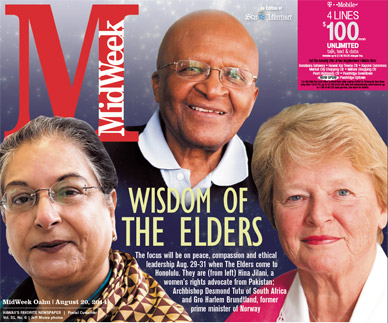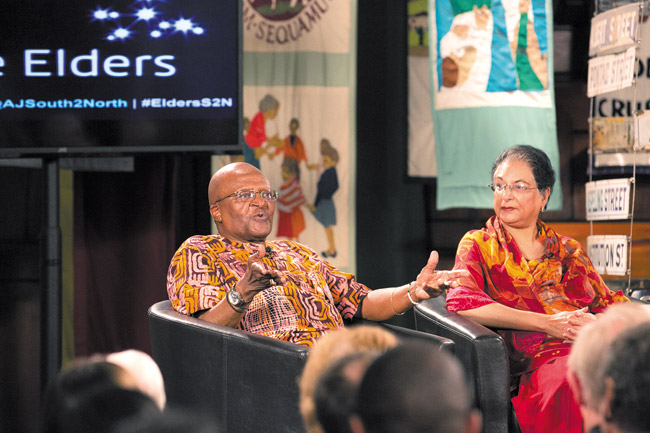Wisdom Of The Elders
The focus will be on peace, compassion and ethical leadership Aug. 29-31 when The Elders come to Honolulu. They are Hina Jilani, a women’s rights advocate from Pakistan, Archbishop Desmond Tutu of South Africa and Gro Harlem Brundtland, former prime minister of Norway and head of the World Health Organization
We’re always told to listen to our elders. That tradition takes on exalted essence next week as three preeminent world leaders come to Hawaii.
mw-082014-cover-theelders-2
Friends, activists, students, lend me your ears.
Pillars of Peace Hawaii, an initiative of Hawaii Community Foundation, will host The Elders Aug. 29-31. Three distinguished global kupuna will engage in a series of exchanges on peace, compassion and ethical leadership.
The Elders who will be in Honolulu are former prime minister of Norway and former director-general of World Health Organization Gro Harlem Brundtland; renowned lawyer/pro-democracy campaigner and Pakistan women’s movement leader Hina Jilani; and Archbishop Desmond Tutu, Nobel Peace Laureate, veteran anti-apartheid activist and peace campaigner.
“We are honored to have such an esteemed group of leaders come to Hawaii to share their global experience and perspectives,” says Kelvin H. Taketa, president and CEO of Hawaii Community Foundation. “Their visit enables us, in turn, to share our approach to peace influenced by the spirit of aloha and our community that merges numerous cultural influences.”
The Elders is an independent group of global leaders brought together by Nelson Mandela in 2007. They use their collective wisdom, experience and influence to support peace building, address major causes of human suffering, and promote the shared interests of humanity.
Pillars of Peace Hawaii is supported by a lead grant from Omidyar Ohana Fund. Pam Omidyar, co-founder with husband Pierre Omidyar of The Omidyar Group, says, “Our main philanthropic goal is to help people have the life they want and to enable them to thrive. Having a peaceful environment is a requirement for that.
“I’m looking forward to The Elders engaging with Hawaii’s own kupuna,” adds Omidyar, a former Iolani student. “We are sharing with them the definition of aloha and the interpretation of ‘ha,’ the breath of life. How do you harm someone when you are sharing the same breath?”
With that intent, we posed three questions to each of The Elders as a preview of their dialogue here. Their responses show the depth of wisdom and experience they possess and why they will be mobbed when they’re here.
Opportunities to meet and learn from such great minds and hearts are rare indeed.
Here’s our three-for-the-trinity treatise.
Gro Harlem Brundtland
1) How do you define peace?
GHB: “For me, peace is more than an absence of war; it is also about equity. There are clear links between globalization, inequity, war, violence and environmental sustainability. We must create a fairer world for people — whether this is helping to create jobs for the huge number of unemployed youth, ensuring girls are educated to the same level as boys, or helping indigenous people secure land rights. If we don’t actively do this, we will never achieve a peaceful world.”
2) What barriers to global harmony do we have today?
GHB: “I think the biggest barriers to global harmony are climate change and environmental degradation. The world is failing to act. Having been involved in sustainable development for many decades, I am pleased to say I have seen some positive progress. Leaders are definitely more aware today of climate change than 10-15 years ago. However, we must do more and we must do it quickly.
“There are strong links between poverty, inequality and environmental degradation. What is needed now is a new era of economic growth — growth that is socially and environmentally sustainable.
“All countries, but in particular big nations like the U.S. and China, must lead by example and tackle these issues head on. There are a series of climate-related meetings coming up (this year and next), and the current political leaders must bury their differences and find a way forward.”
3) What’s your message to students (tomorrow’s leaders)?
GHB: “Do something! We all have a role to play — whether small or large. Think about how you want to make a difference. What do you want to contribute? We all are born to make some kind of contribution and through this we will grow ourselves. Each one of us can make a positive difference to this world of ours. We all have a shared responsibility to the future of this planet.”
Hina Jilani
1) What is deterring us from a universally peaceful existence?
HJ: “There are many human rights abuses and acts of injustice which affect people everywhere every day. You have to look no further than how women are treated in some societies to understand what I mean. Unless we strive toward equality — between sexes, religions, races — I don’t see how we can truly live peacefully. With no recourse to justice when perpetrators of human rights abuses are allowed to act with impunity, how can we ever hope to live in a peaceful world?”
2) What’s the value or role of activism?
HJ: “The struggle to realize human rights is constant and never-ending. We all have a role to play as activists. Rights are not ‘self-executing.’ Without courageous people to challenge injustices and ensure that our human rights are respected, we can have the most progressive human rights laws but live under oppression. It is activists like Nelson Mandela who make rights meaningful, who give effect to documents and standards like the Universal Declaration of Human Rights.
“I am a lawyer and human rights defender. I grew up in Lahore, Pakistan, in a family where human rights was always a subject of conversation. My father was a political activist who was committed to speaking out for basic freedoms. I am a strong believer in speaking out but also engaging in dialogue so we can truly get to the truth of a situation and see it from all sides.
“Dialogue is the only answer; weapons never are.”
3) What’s the role of government and politicians in global harmony?
HJ: “Our governments have the legal obligations to respect, protect and fulfill human rights. However, it is ‘human rights defenders’ who ensure that these obligations are met.
“These people come from all backgrounds and occupations. They are members of civil society groups and political movements, community leaders and journalists, and lawyers and teachers. Bridging the gap between lofty human rights agreements and the situation on the ground, they inform and educate the public on their rights, demand accountability from governments, and expose atrocities and rights violations.
“They carry out these activities despite being subject to harassment, detention, torture and even assassination. Without these people holding our governments and politicians to account, we can never ensure global harmony.”
Desmond Tutu
1) What role do you see for Hawaii in global harmony?
DT: “I am delighted to be returning to these beautiful islands. You are truly blessed to be living here. It strikes me as a place where you can live in harmony with one another other and with your environment. As a diverse, multicultural community, you respect each other’s values and your shared humanity. You are a shining example of how the world can live together, caringly and peacefully.”
2) What are your hopes for the Pillars of Peace program?
DT: The Pillars of Peace is a wonderful program founded by the Omidyar family, whom I have known for many years. I cannot imagine a better way to cultivate compassion, mindfulness and justice in our daily lives and to better understand the meaning of diversity and culture in the practice of peace. I hope that the Pillars of Peace program will continue to inspire many restless young people who will go into the world and alleviate the suffering of others. 3) How you do define peace?
DT: “To me, peace can mean many things, but I think one word can sum it: Ubuntu. This is an African saying that means ‘I am because you are.’ We are bound together. I need you in order to be me.
“We cannot hope to bring peace to the world unless we can empathize with each other, offer one another forgiveness and work together. Despite all of the ghastliness in the world, humans are made for goodness.
“My fellow South African and founder of The Elders, Nelson Mandela, taught us that we cannot do it alone. We must work together to improve this world of ours.”
MEET THE ELDERS
The community has the unique opportunity to listen to this world-renowned group of leaders Sunday, Aug. 31, at 4 p.m. in a public forum titled “A Just and Inclusive Global Community” at Hawaii Convention
Center’s Liliu Theater. Tickets for the public presentation are available at pillarsofpeacehawaii.org/schedule-tickets-the-elders. Admission costs $12 for students; general admission is $20 and includes validated parking.
Student leaders selected by schools meet with The Elders Aug. 30 in prearranged programs.







